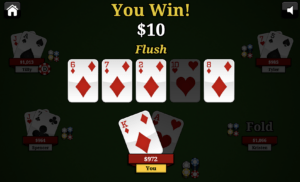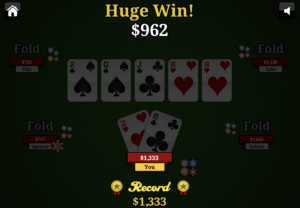For this week’s critical play I played several rounds of online poker. The card game is believed to have been developed by French settlers in the New Orleans area during the early 1800s. However, Texas Hold’em style, which is the version that I played, is said to have been invented by gamblers in the state of Texas during the early 1900s. The game is most commonly played with a physical deck of cards and is usually made available at casinos. The game can also be played online through various websites. Although it is popular as a gambling game, it can also just be played casually by using chips or some kind of point system to keep score. Still, poker targets low to middle income people that hope to win it big at a game that combines skill and chance.
Before this week, I had always seen gameplay of poker but never got that interested. I think I just found it way too tedious to remember all the 5-card hands and their relative rankings to each other. Even when I played this week, I always had the hands pulled up so I could keep track if I had any real footing in the game.
I would say though one of my biggest fails was when I won a game by having a flush. However, I still was not familiar with the winning hands and I also was not that confident that I would get the suit that I needed. Thus, when the last card ended being a matching suit, it s already too late to raise the bidding and obtain more money.

However, my biggest win was when I decided to raise the bidding by the highest number I could, which was $150. I did this regardless of my cards just to see how other players would react. At first, 2 players folded while the others called, which scared me a little bit. But after I raised by $150 again, the other players folded and I won a large amount of money without having that great of a hand.

I imagine that there are certain hands that are way better to start off with and others that are not that good. People playing for years would know, but I definitely don’t. Thus, there is some skill that is involved. Furthermore, there are tactics where players that are facing each other in real life can implement to achieve better outcomes. For instance, players can bluff and maintain a “poker face” to have other competitors second-guess their choices. This represents a challenge and expression type of fun.
On the other hand, players may also get into a “zone” where they numb their thoughts and continue betting money in hopes of a big winning. This type of fun would be submission. Players can essentially space out and focus purely on the cards and their possible combinations to obtain a valuable hand. If they keep getting near misses where they maybe did just a little worse than the winning player, then they may feel that the next turn may be their opportunity for a win. This same effect is found in slot machines when players miss a jackpot by a single digit.
I would say that the main flaw of this game is its over reliance of chance as a part of its gameplay. Gamers who prefer to improve and win by skill, such as me, may find continuous rounds of poker to drag on longer than they prefer. I could only play for about 30 minutes before I got bored. Thus, players who want more engagement with their games would not like poker.



